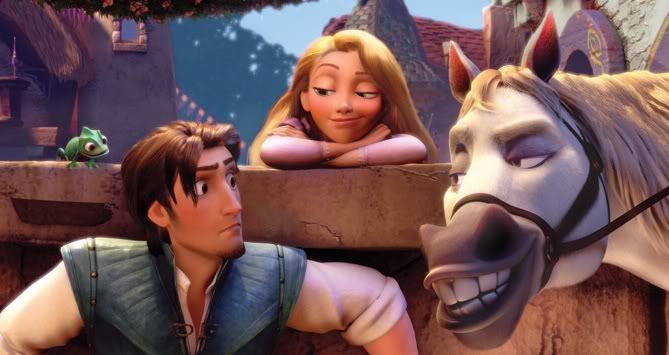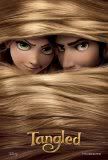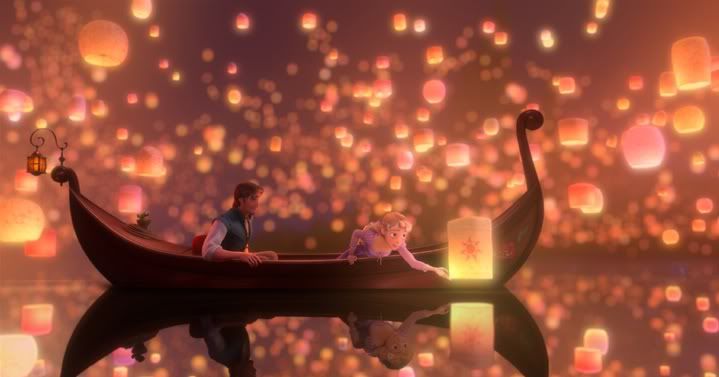Should I see it?
Yes.
Short Review: One of the joys of being a father of a small girl is the privilege of indulging her girly side: attending her tea parties, complementing her when she wears a new outfit and taking her to see fun, light feminine films like this one.
Disney, the once monopolistic empire of animation, has fallen under the shadow of Pixar over the past couple of decades. While Disney as a corporation controls Pixar, the Disney brand still suffers from the comparison. While Disney has produced some more conventional looking films like Bolt and Meet the Robinsons, the productions made to replicate their majestic, classic works such as Bambi, Snow White, Cinderella and Pinocchio have been faded, forgettable efforts such as Mulan, Lilo and Stich.
With this adaptation of the Brothers Grimm fairy tale Rapunzel, it appears Disney is attempting once again to recreate the success of their early 1990's revival (The Little Mermaid, Aladdin and The Lion King). While this won't most likely have the lasting power of The Lion King or The Little Mermaid, this is still a wonderful, enjoyable movie.
I should stop and alert you that this does not follow the actual fairy tale. Rapunzel is a German tale and my Kraut brethren have a tendency to pump their stories with plenty of unpleasant details. If you don't recall how the actual story goes, here is a summary:
A infertile couple who live next to a witch find plants on her land that help them conceive. The witch catches the husband stealing the plant one day. She agrees to spare the man's life if he hands over their daughter following her birth. The father reluctantly agrees.
Rapunzel is born and given to the witch as promised. The witch hides her away in a tall tower with only a small door high on top for an entrance. The witch gains entry by standing under the door and calling "Rapunzel! Rapunzel, let down your golden hair!" The girl then drops her long hair and the witch uses it to be carried up into her room.
One day a handsome prince happens by and hears the witch calling to the girl. That night the prince calls up to her and she pulls him up into her room. The two quickly fall in love and continue their nightly, secret encounters. Before long, Rapunzel admits to the witch that her dress has become too tight through the stomach (I guess that's one way of describing it). The witch is infuriated and cuts off Rapunzel's hair and banishes her to the forest to die alone. Apparently, the Germans were hardliners against single-motherhood.
The prince calls up, not knowing the witch is waiting in ambush. The witch lowers the hair and the prince is pulled up to the room. To his surprise, he finds the old woman instead of his love. The witch pushes him out of the tower and he falls to the wild plants below and is blinded by the thorns. He wanders the forest blind and alone. Apparently, the Germans were hardliners against dead-beat dads.
The prince, alone in the woods, hears the sound of Rapunzel singing by a brook. He finds her and his condition saddens the girl. She cries and her tears heal his blinded eyes. The two, reunited and healthy, return to his kingdom and get married and have children of their own.
Is it me or does the ending seem a little inorganic? Sounds like someone wrote themselves into a corner and didn't know how to end their story.
In this friendlier version Rapunzel's parents are the royalty and she is their princess. One day a "drop of sunlight" falls to earth and it raises a magical flower. The conniving Mother Gothel finds the mystical flower and uses its properties to keep herself youthful for years. When Rapunzel is born, her mother suffers from the pains of birth and is near death. The king's men find the sun flower and use its powers to spare the life of the queen. Its application also provides the newborn Rapunzel with magical hair.
Mother Gothel, wanting her youthful elixir, steals Rapunzel (so she can sing her spell to make her hair give her youth) and hides the girl in a tower and pretends to be her mother. Each year the royal couple hold a light show in memorial of their missing daughter. Annually, Rapunzel watches the beautiful light show outside her tower window, not knowing it is intended for her. Her dream is to one day see the light show up close.
Rapunzel's isolation is interrupted when a handsome thief who goes by the pseudonym Flynn Ryder finds the tower. The two travel to the kingdom to see the light show. The problem? The local authorities, Flynn's criminal competition and the evil Mother are giving chase.
 As you can see, this version has taken some broad liberties from the original source, but it works very well. The script by Dan Fogelman (Cars) is remarkably tight and cleverly laid out. Fogelman perfectly meshes all of the conventions of the fairytale with all of the requirements of a Disney production (the strong father/daughter relationship, the comical animal familiars (represented by a horse and a chameleon), the musical routines, etc.) His dialog is sharp and he has his scenes cut down to the essentials. Great work.
As you can see, this version has taken some broad liberties from the original source, but it works very well. The script by Dan Fogelman (Cars) is remarkably tight and cleverly laid out. Fogelman perfectly meshes all of the conventions of the fairytale with all of the requirements of a Disney production (the strong father/daughter relationship, the comical animal familiars (represented by a horse and a chameleon), the musical routines, etc.) His dialog is sharp and he has his scenes cut down to the essentials. Great work.The production as a whole is quite fun and uplifting. Children, in particular girls, will enjoy watching the movie. It is a solid pick for family viewing. The sunny disposition of the movie is infectious and a great change of pace from the usual schlock thrown out at the kids these days. There is a wonderful absence of sexual innuendo, scatological humor or political references which have become so commonplace in "family films". This is a straight-forward piece of entertainment that delivers.
Two cautions for Christians is the hint of paganism in the tale. As mentioned, this has its roots in the old Teutonic tale which was derived from an Iranian myth. The inclusion of mysticism in pretty much unavoidable. I didn't find these elements to be too intrusive. They are there but it isn't anything that can't be resolved by quickly resolved with a brief explanation to your youngster.
The other issue is how Flynn's thievery is handled. He is supposed to be the romantic rouge character and this is used for humor throughout the film. He is a mockery of the type. However, the film never takes a strong position on his stealing. It is just something he does. There is no moral judgment made which means it provides passive support for it. This is something that should be addressed for the little viewers.
I highly recommend this movie. If Disney keeps on this path, they may just get their groove back.
Click here to buy your copy of
You Are What You See:
Watching Movies Through a Christian Lens









No comments:
Post a Comment